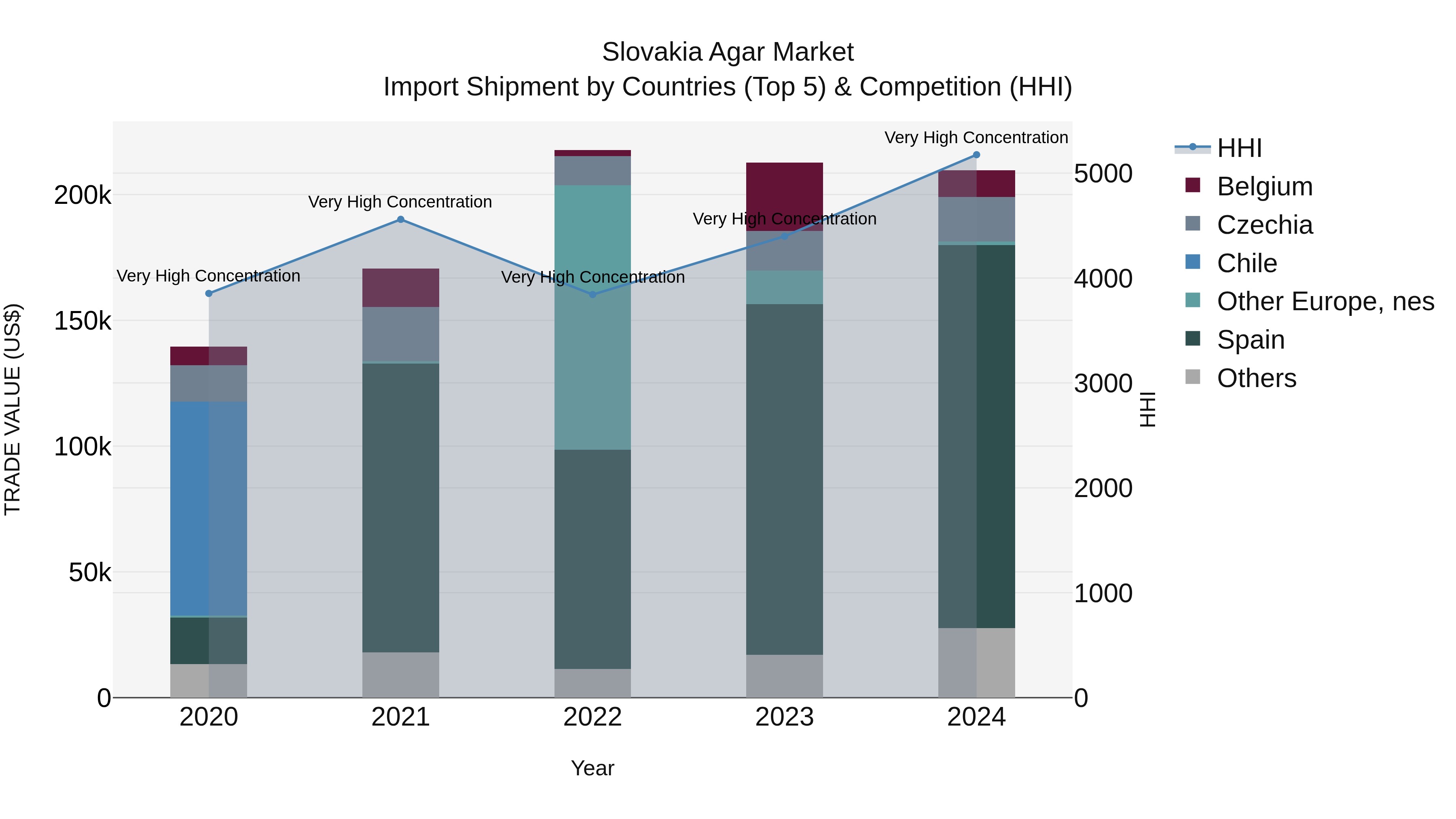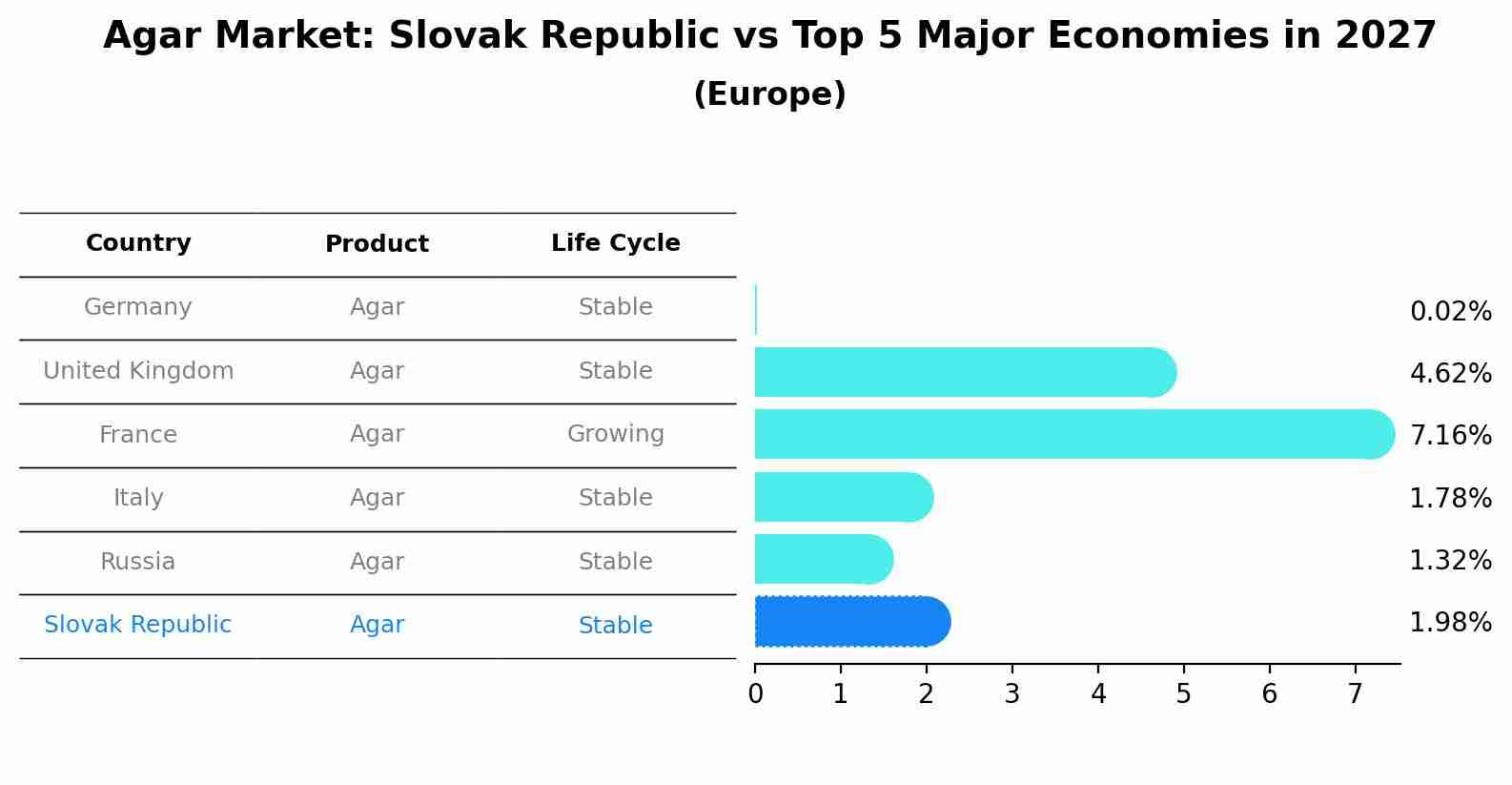Slovakia Agar Market Outlook | Revenue, Companies, Trends, Growth, Share, COVID-19 IMPACT, Value, Forecast, Industry, Size & Analysis
| Product Code: ETC388400 | Publication Date: Aug 2022 | Updated Date: Nov 2025 | Product Type: Market Research Report | |
| Publisher: 6Wresearch | Author: Vasudha | No. of Pages: 75 | No. of Figures: 35 | No. of Tables: 20 |
Slovakia Agar Market Top 5 Importing Countries and Market Competition (HHI) Analysis
Slovakia continues to depend on a select few countries for its agar imports, with Spain, Czechia, Germany, China, and Belgium leading the way in 2024. The high Herfindahl-Hirschman Index (HHI) indicates a Market Top 5 Importing Countries and Market Competition (HHI) Analysis dominated by a few key players. Despite a healthy compound annual growth rate (CAGR) of 10.72% from 2020 to 2024, there was a slight decline in growth rate from 2023 to 2024. This suggests a potential stabilization or shift in the Market Top 5 Importing Countries and Market Competition (HHI) Analysis dynamics. Monitoring these trends closely will be crucial for stakeholders in the agar import industry in Slovakia.

Agar Market: Slovak Republic vs Top 5 Major Economies in 2027 (Europe)
By 2027, the Agar market in Slovak Republic is anticipated to reach a growth rate of 1.98%, as part of an increasingly competitive Europe region, where Germany remains at the forefront, supported by United Kingdom, France, Italy and Russia, driving innovations and market adoption across sectors.

Slovakia Agar Market Synopsis
The Slovakia agar market is experiencing steady growth due to the increasing demand for agar in various industries such as food and beverage, pharmaceuticals, and cosmetics. Agar, a natural gelling agent derived from seaweed, is valued for its superior gelling properties and versatility in applications. The food industry is a key driver of the agar market in Slovakia, with agar being used in dairy products, confectionery, and as a vegetarian alternative to gelatin. The pharmaceutical and cosmetics sectors also contribute to the market growth by utilizing agar in drug delivery systems and skincare products. The market is characterized by the presence of both domestic and international agar manufacturers, offering a range of agar products to cater to the diverse needs of the Slovakian market.
Slovakia Agar Market Trends
The Slovakia Agar Market is witnessing several key trends. One prominent trend is the increasing demand for agar in the food and beverage industry, particularly in the production of plant-based alternatives and confectionery products. Additionally, there is a growing interest in agar as a vegan-friendly and gluten-free ingredient, driving its use in various food applications. Another trend is the rising awareness of agar`s health benefits, such as its potential role in digestive health and weight management, leading to its inclusion in dietary supplements and functional foods. Furthermore, the market is seeing innovation in agar-based products, with manufacturers developing new formulations and flavors to cater to changing consumer preferences and dietary requirements. Overall, these trends are shaping the growth and diversification of the Slovakia Agar Market.
Slovakia Agar Market Challenges
In the Slovakia Agar Market, some of the key challenges faced include fluctuating raw material prices, limited availability of high-quality agar sources, and increasing competition from substitute products. Fluctuating raw material prices can impact production costs and profit margins for agar manufacturers, making it challenging to maintain pricing stability. The limited availability of high-quality agar sources can lead to supply shortages and quality inconsistencies, affecting product reliability. Additionally, the rising competition from alternative gelling agents and plant-based substitutes poses a threat to the traditional agar market, requiring companies to differentiate their products and adapt to changing consumer preferences. Overall, navigating these challenges requires agar market players in Slovakia to invest in sustainable sourcing practices, product innovation, and strategic marketing efforts to stay competitive in the industry.
Slovakia Agar Market Investment Opportunities
The Slovakia agar market presents promising investment opportunities due to increasing demand for natural and plant-based ingredients in various industries such as food and pharmaceuticals. Agar, derived from seaweed, is a versatile gelling agent and stabilizer that is widely used in food products, microbiology, and biotechnology. With the growing trend towards clean label and vegan products, the demand for agar as a natural alternative to synthetic additives is expected to rise. Additionally, agar is known for its high gel strength, stability, and versatility, making it a preferred choice for manufacturers looking to enhance the texture and quality of their products. Investing in agar production or distribution in Slovakia could be a lucrative opportunity as the market continues to expand and diversify.
Jordan Agar Market Government Policies
The Slovakia Agar Market is regulated by the European Union`s Common Agricultural Policy (CAP), which governs agricultural production, trade, and subsidies. Slovakia, as an EU member, adheres to CAP regulations, which provide support for farmers through direct payments, market measures, and rural development initiatives. Additionally, the Slovak government has implemented specific policies to promote sustainable agriculture, including measures to mitigate climate change impacts and encourage organic farming practices. The government also monitors and regulates the quality and safety standards of agar produced in Slovakia to ensure compliance with EU regulations and consumer protection. Overall, the Slovakia Agar Market operates within the framework of EU agricultural policies and local regulations to support sustainable production and ensure market competitiveness.
Slovakia Agar Market Future Outlook
The outlook for the Slovakia agar market appears positive, with a steady growth trajectory expected in the coming years. The increasing demand for agar in various industries such as food and beverage, pharmaceuticals, and biotechnology is driving market growth. Agar is widely used as a gelling agent, stabilizer, and thickener in food products, which is contributing to its rising popularity among consumers. Additionally, the growing trend towards plant-based and natural ingredients in food products is expected to further boost the demand for agar as a gelatin substitute. Market players are focusing on product innovation and expanding their product portfolios to meet the evolving consumer preferences, which will likely support the market growth in Slovakia. Overall, the Slovakia agar market is poised for expansion in the foreseeable future.
Key Highlights of the Report:
- Slovakia Agar Market Outlook
- Market Size of Slovakia Agar Market, 2021
- Forecast of Slovakia Agar Market, 2031
- Historical Data and Forecast of Slovakia Agar Revenues & Volume for the Period 2018 - 2031
- Slovakia Agar Market Trend Evolution
- Slovakia Agar Market Drivers and Challenges
- Slovakia Agar Price Trends
- Slovakia Agar Porter's Five Forces
- Slovakia Agar Industry Life Cycle
- Historical Data and Forecast of Slovakia Agar Market Revenues & Volume By Form for the Period 2018 - 2031
- Historical Data and Forecast of Slovakia Agar Market Revenues & Volume By Strip for the Period 2018 - 2031
- Historical Data and Forecast of Slovakia Agar Market Revenues & Volume By Powder for the Period 2018 - 2031
- Historical Data and Forecast of Slovakia Agar Market Revenues & Volume By Others for the Period 2018 - 2031
- Historical Data and Forecast of Slovakia Agar Market Revenues & Volume By Application for the Period 2018 - 2031
- Historical Data and Forecast of Slovakia Agar Market Revenues & Volume By Food and Beverage for the Period 2018 - 2031
- Historical Data and Forecast of Slovakia Agar Market Revenues & Volume By Pharmaceuticals for the Period 2018 - 2031
- Historical Data and Forecast of Slovakia Agar Market Revenues & Volume By Other Applications for the Period 2018 - 2031
- Slovakia Agar Import Export Trade Statistics
- Market Opportunity Assessment By Form
- Market Opportunity Assessment By Application
- Slovakia Agar Top Companies Market Share
- Slovakia Agar Competitive Benchmarking By Technical and Operational Parameters
- Slovakia Agar Company Profiles
- Slovakia Agar Key Strategic Recommendations
Frequently Asked Questions About the Market Study (FAQs):
- Single User License$ 1,995
- Department License$ 2,400
- Site License$ 3,120
- Global License$ 3,795
Search
Thought Leadership and Analyst Meet
Our Clients
Related Reports
- Germany Breakfast Food Market (2026-2032) | Industry, Share, Growth, Size, Companies, Value, Analysis, Revenue, Trends, Forecast & Outlook
- Australia Briquette Market (2025-2031) | Growth, Size, Revenue, Forecast, Analysis, Trends, Value, Share, Industry & Companies
- Vietnam System Integrator Market (2025-2031) | Size, Companies, Analysis, Industry, Value, Forecast, Growth, Trends, Revenue & Share
- ASEAN and Thailand Brain Health Supplements Market (2025-2031) | Strategy, Consumer Insights, Analysis, Investment Trends, Opportunities, Growth, Size, Share, Industry, Revenue, Segments, Value, Segmentation, Supply, Forecast, Restraints, Outlook, Competition, Drivers, Trends, Demand, Pricing Analysis, Competitive, Strategic Insights, Companies, Challenges
- ASEAN Bearings Market (2025-2031) | Strategy, Consumer Insights, Analysis, Investment Trends, Opportunities, Growth, Size, Share, Industry, Revenue, Segments, Value, Segmentation, Supply, Forecast, Restraints, Outlook, Competition, Drivers, Trends, Demand, Pricing Analysis, Competitive, Strategic Insights, Companies, Challenges
- Europe Flooring Market (2025-2031) | Outlook, Share, Industry, Trends, Forecast, Companies, Revenue, Size, Analysis, Growth & Value
- Saudi Arabia Manlift Market (2025-2031) | Outlook, Size, Growth, Trends, Companies, Industry, Revenue, Value, Share, Forecast & Analysis
- Uganda Excavator, Crane, and Wheel Loaders Market (2025-2031) | Strategy, Consumer Insights, Analysis, Investment Trends, Opportunities, Growth, Size, Share, Industry, Revenue, Segments, Value, Segmentation, Supply, Forecast, Restraints, Outlook, Competition, Drivers, Trends, Demand, Pricing Analysis, Competitive, Strategic Insights, Companies, Challenges
- Rwanda Excavator, Crane, and Wheel Loaders Market (2025-2031) | Strategy, Consumer Insights, Analysis, Investment Trends, Opportunities, Growth, Size, Share, Industry, Revenue, Segments, Value, Segmentation, Supply, Forecast, Restraints, Outlook, Competition, Drivers, Trends, Demand, Pricing Analysis, Competitive, Strategic Insights, Companies, Challenges
- Kenya Excavator, Crane, and Wheel Loaders Market (2025-2031) | Strategy, Consumer Insights, Analysis, Investment Trends, Opportunities, Growth, Size, Share, Industry, Revenue, Segments, Value, Segmentation, Supply, Forecast, Restraints, Outlook, Competition, Drivers, Trends, Demand, Pricing Analysis, Competitive, Strategic Insights, Companies, Challenges
Industry Events and Analyst Meet
Whitepaper
- Middle East & Africa Commercial Security Market Click here to view more.
- Middle East & Africa Fire Safety Systems & Equipment Market Click here to view more.
- GCC Drone Market Click here to view more.
- Middle East Lighting Fixture Market Click here to view more.
- GCC Physical & Perimeter Security Market Click here to view more.
6WResearch In News
- Doha a strategic location for EV manufacturing hub: IPA Qatar
- Demand for luxury TVs surging in the GCC, says Samsung
- Empowering Growth: The Thriving Journey of Bangladesh’s Cable Industry
- Demand for luxury TVs surging in the GCC, says Samsung
- Video call with a traditional healer? Once unthinkable, it’s now common in South Africa
- Intelligent Buildings To Smooth GCC’s Path To Net Zero


















